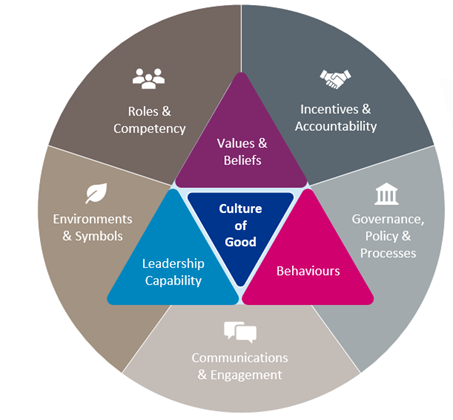Leaders today recognise the importance of culture and will often believe that their organisation has a positive and customer-focused culture. However, many top and mid-level managers struggle to clearly and consistently articulate the intended culture of their organisation, as well as the tangible and measurable outcomes that it drives. Enter the Consumer Duty.
The Consumer Duty is clear that a strong, measurable and regularly monitored culture is key to being able to deliver good customer outcomes, which reflects a wider trend in regulatory publications over the last two to three years in themes such as individual accountability, stronger governance, diversity and inclusion and vulnerable customers.
Our article looks at some of the ways firms can define, influence and measure culture to support the requirements of the Consumer Duty and more broadly the growing expectations of the FCA in this area.
It starts with creating and sustaining the right values, behaviour and leadership.
With targeted interventions, you can create momentum to drive change, focusing on these three areas to help win the hearts and minds of the people who drive, deliver and demonstrate change as part of an evidence-based culture. We’ve identified three actions to help drive the change needed:

Find alignment with your purpose and values
Purpose and values are strategic business elements that can help guide organisations to work towards achieving broader, firmwide goals.
You need to find opportunities for your people to engage with these values and reflect on them within the context of consumer good. This will help influence business decisions, inspire employees and ultimately establishes customer loyalty. This could include supporting customers to meet their needs and realise their aspirations – buying a new home or saving for retirement, for example.
Instil the right behaviour
All-out cultural change takes time. But behaviours can be modified quite quickly to help lay the foundations for a broader and more enduring cultural shift. You need to engage with your people to understand which key behaviours could be introduced, altered or removed in order to drive the most impact for good consumer outcomes.
Many of your employees along the customer journey may already be looking at whether their customers understand the financial products they are buying, and are trying to ensure these products meet their financial objectives. It is essential to ask the right questions and establish robust processes to facilitate this. This might include reviewing your training materials through a Consumer Duty lens.
Create an infrastructure to drive and sustain change
Start with your leaders. Managers can be leaders, but so can long tenured employees, high performers, as well as popular or cultural icons within your teams. It’s all of these influential people who need to embrace and embody cultural change. Firms need to ensure these people are on board with the culture shift and with an understanding of what is needed from them.
Aligning your purpose and values to consumer good, instilling the right behaviours and empowering your leaders will take you a long way, but critically they need to be supported by the right infrastructure. This is where you need to consider your incentives and accountability processes, governance structures and processes, communications and engagement, job roles and so on. These should be aligned to what you’re asking of your people, because we know from psychology that if there is dissonance between the expectations you put on your people and the infrastructure you surround them with, stress will arise.
A winning culture
The FCA are applying a more assertive supervisory approach and are moving to an evidence-based culture. Most firms believe they have a strong culture and are already delivering good outcomes.
But an embedded ‘good culture’ is something that must be intentional and as such, it needs to be defined, assessed, measured and continuously reenforced. A winning culture is one that sets the stage for positive attitudes, high expectations and strong performance. And with targeted interventions, you can create the urgency and momentum to drive the necessary change.
Changing culture is hard, but in addition to achieving Consumer Duty compliance, a purpose-led culture can help attract talent, and will ultimately be the mark of the most successful organisations in the market.
If you'd like to know more about the Consumer Duty and how to develop a cohesive good outcomes framework and embed it in your culture, please contact us.
Our Experts


Related Insights

Consumer Duty: What’s next? Five focus areas for the months ahead
The FCA’s Consumer Duty rules went live on 31 July 2023. We look at five key points firms should consider in the next 12 months.
Read more
Why the Consumer Duty will empower firms to combat greenwashing
What are the regulator’s intended outcomes from SDR and how are they linked to the Consumer Duty?
Read more
Essentials for Consumer Duty implementation
Struggling with Consumer Duty requirements? Meet FCA standards for better consumer care with Baringa's expert guidance.
Read more
Turning compliance into competitive advantage: how to move up the Consumer Duty maturity curve
Discover how to transform the Consumer Duty into a market differentiator. Explore maturity stages, benefits, and steps for maximizing your business potential today.
Read more